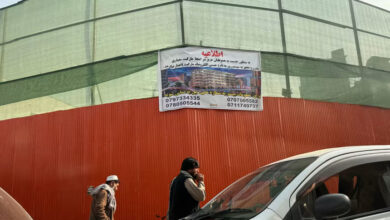For almost all producers, the poor performance of Eid el-Fitr films concluded disappointing summer season for Egypt’s cinema industry
The Egyptian film industry is suffering in this time of global economic crisis, though it’s unclear if it is just international economics that are the cause.
Depending largely on external venues to market their movies, in particular Gulf-based television stations and distribution companies, the majority of Egypt’ cinema tycoons stuck to an old-style production and distribution logic instead of looking for alternatives.
The Egyptian Chamber of Cinema Industry declared that production has dropped by in 2009 to only 12 films down from 60 in 2007, and 57 in 2008.
“Unlike Hollywood, Egyptian producers do not depend on bank loans, so the tight credit market would not affect us,” said director and producer Sherif Mandour.
Mandour’ remarks reflect the fact that Egyptian banks normally refrain from giving loans to film producers due to the high risks involved in this industry. Never the less, with oil revenues decreasing by half in 2009 and advertising income dropping by around 40 per cent in the Gulf region, Egyptian producers were badly affected.
“Gulf TV stations are run by petrodollars. You can never guarantee they will keep buying," said Mandour. "When they face real crisis, they will cut expenses because they receive less advertisements and publicity from huge corporations. This is the cycle that eventually endangers the Egyptian film industry.”
Other producers seem less worried about their revenues.
A marketing officer in a leading Egyptian production and distribution company asserted that their movies were sold to satellite channels even before filming begins.
“Gulf channels have decreased the number of films they intended to buy and would bargain for better payment conditions which would partly lessen our revenues, but the films will eventually be sold and prove to be a beneficial investment,” the marketing officer said in an interview with Al-Masry Al-Youm English Edition, speaking on the condition of anonymity.
But for almost all producers, the poor performance of Eid el-Fitr films concluded a disappointing summer season. Many producers are now wondering if they should have instead waited to release their movies at a later date.
Producers started trying to sell their films in May 2009, hoping to capitalize on the summer movie market before Ramadan began in August. The holy month, which is known to be a season for TV drama when viewers tend to stay home, shortened the summer to eight to ten weeks. During the short summer, 13 movies competed for viewers, in the hope of recovering some of the expenses poured into production this year.
An early Ramadan and the global financial crisis were not the only factors inhibiting film industry profits this year. Fears of the swine flu epidemic, the ‘black drama’ genre which appeared as the main theme in this year films, World Cup qualifying matches, and a preponderance of electronic piracy that makes movies available for download before they are released on DVD all contributed to limited ticket sales.
“Despite all these disastrous circumstances, Omar we Salma, starring Tamer Hosny, Alf Mabrouk starring Ahmed Helmy, and Teer Enta, starring Ahmed Mekky all made high revenues and a strong impression,” said critic Tarek el-Shenawi.
Omar we Salma, which was released in May, topped revenue charts at LE24.5 millions, while Alf Mabrouk and Teer Enta earned LE11 and LE8 million respectively, though their release dates were two months later.
Films like Ibrahim Al Abyad, produced by Good News group, Dukkan Shehata and Ehky ya Shehrezad, produced by Al Batros Company, el-Farah, by the producer Ahmed el-Sobky, all proved disappointments despite giant budgets.
Mohsen Boghdady, a distribution officer in el-Nasr Company, one of Egypt’ leading production outlets, estimated that this year’s revenues diminished by 40 per cent from last year. The total budgets spent on thirteen summer movies reached LE195 million while revenues were LE114 million.
Eid films continued the downward summer trend. Producers apparently released their "leftover" movies and kept their more promising ones for Eid el-Adha season, which begins at the end of November.
Six diverse films from young filmmakers and actors passed unnoticed by Eid audiences over-saturated with Ramadan social dramas. The exception was Enas el-Deghidy’s Moot Amira.
The stream of light comedies like “el-Dictator, Ebaa Abelny, El-Hekaya Feha Menna, El-Academeia, and Akhfakhina” could not catch the attention of Eid cinema-goers. The disappointing revenues for this year’s Eid el-Fitr movies have left filmmakers uncertain about future productions. Furthermore, the change in the lunar calendar that will place Ramadan in the middle of the summer season next year means that producers will have to give up their dependence on summer revenues.
“Cinema is very susceptible to external influences, more than any other cultural industry," said the critic el-Shenawi. "Football affects cinema because both appeal to the same young audience, so timing is cornerstone in presenting cinema productions. In the coming years, producers will try to avoid Ramadan. Eid el-Fitr will become again the hot season, like it used to be in the 1990s.”
Executives in production companies have unanimously declined to provide details of summer and Eid revenues.
Expectations for a decrease in the number of film produced may prove realistic. “The number of films produced per year will decrease, but the budget allocated for each film will remain the same," said a marketing official at one of Egypt’s largest production companies. "The coming movie of [Egyptian star] Karim Abdel Aziz, Awlad El Am, was shot without changes in the wages of stars and technicians. We cannot afford to pay less for the superstars. They are the backbone of the industry.”
Critics agree that producers will end up submitting to the wills of superstars. “Unlike every known international standard, the wages of Egyptian superstars are not a liable for supply and demand,” said el-Shenawi.
“We have the worst aspect of a capitalistic market: monopoly. Big companies control production and distribution and boost the ego of the stars as the principal determinant in the production process.”
Shenawi expects that filmmakers will approach the consequences of the financial crisis in a "negative" way. “Hollywood eliminated monopoly in the 1970s. Here, we would reduce the cost of production in items like décor and materials, preferring not to touch the prices of the stars,” he said.
Mandour, who recently produced the critically acclaimed movie Ain Shams, proposes a different strategy for reducing the negative impact of the financial crisis by addressing aspects of both production and distribution. Mandour recommends that filmmakers "capitalize on increasing revenues by finding new buyers and unconventional markets in Asia, Europe and America.”
"In my coming films Warakat Toot and Ada Sereya I worked with low cost, yet high quality technology," said Mandour. "And I offered my actors to be partners in productions by receiving a post-payment after selling the movies.”




